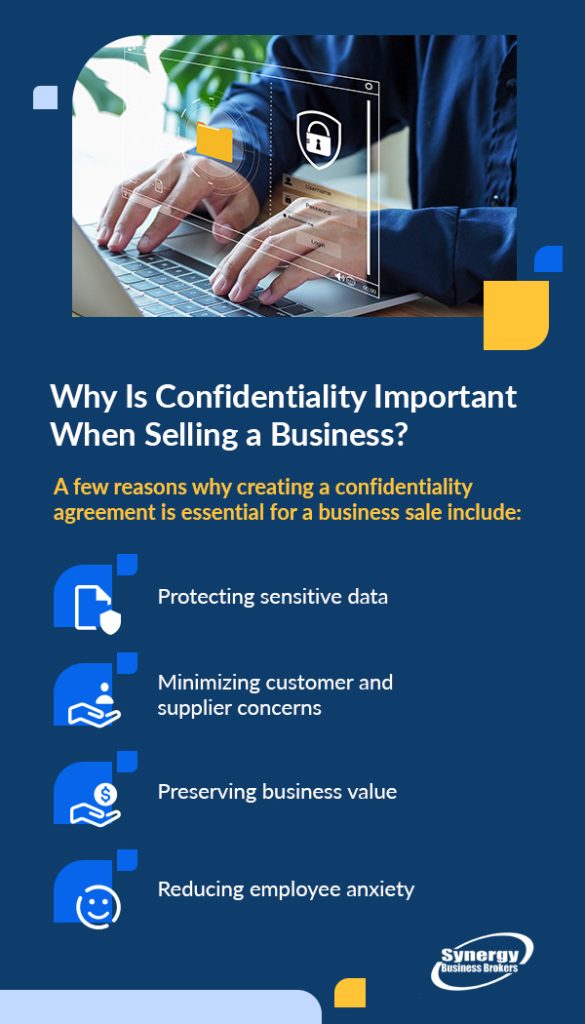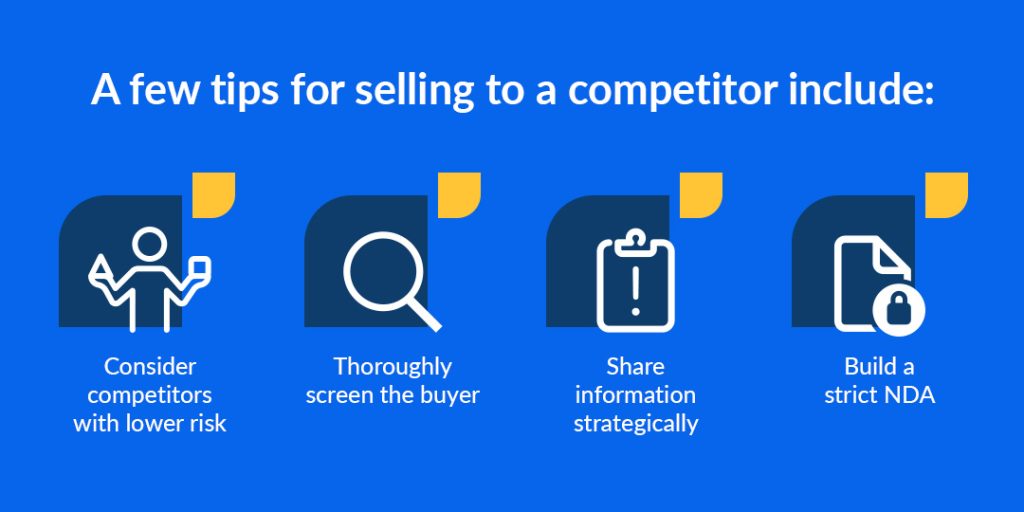
Blake Taylor
What Is the Best Way to Sell a Profitable Business?
Selling a profitable business is one of the most significant financial decisions you can make as a business owner. A …
7 MIN READ
Read More

How do you keep the sale of your business confidential? This question is important because you don’t want your employees, customers, competitors, or suppliers to know that your business is for sale. It’s much better to let everyone know after a deal is completed. Then, you can introduce the buyer.
Following these steps makes people more comfortable with the sale and helps with an orderly transition of the business. Uncertainty makes people anxious and may make them want to change jobs or who they do business with. Protecting confidentiality is in everyone’s best interest.
The most effective way to keep the sale of a business confidential is to have a third party screen the buyers and make sure that they sign a business sale non-disclosure agreement (NDA) to keep the details under wraps.
According to one projection, over 12 million small businesses could be sold in the next 10-15 years. While it may be tempting to advertise the sale of your business far and wide with the hopes of getting as many offers as possible, sharing information about a business sale can be a big risk. If a sale doesn’t go through or you change your mind, you want to ensure your business and your data are both protected.

A few reasons why creating a confidentiality agreement is essential for a business sale include:
Selling a business involves a complex series of moving parts, and it is a completely unique process from selling a property. For example, you wouldn’t want to post a listing on a website about the sale — keeping your business’ identity a secret can ensure a smooth sale with the least amount of disruptions to your profits and operations.
One of the most important factors in keeping the sale of your business confidential is partnering with a business broker experienced in mergers and acquisitions (M&A).
The benefit of using an experienced business broker is that they are used to selling businesses confidentially. They can build anonymous listings that attract serious inquiries. Experienced business brokers will also have an extensive database of potential buyers to contact. This prospective buyer database should include buyers in your industry as well as related sectors and private equity groups that focus on your industry.
When selling a business, you don’t want to release all of your confidential information too early. For example, you would usually wait to release certain sensitive information, such as customer contacts or information on employees or suppliers, until you are firmly in the sales process and possibly have a purchase and sale agreement in place.
In some cases, some of the information may not be released until after the deal is closed. Working together with your M&A advisor and attorney, as well as the buyer’s advisors, can help you devise a plan that satisfies all parties.
Below are some important steps in building a business confidentiality agreement.

In order to maximize the price of your business, you need to let a number of potential buyers know that your business is for sale. The first step in a business sale is often building a listing, which includes getting information about the business, reviewing the financial information, and providing a potential selling price.
The broker will write a one-page ad or description about the business, sometimes referred to as a blind teaser. This document shouldn’t have the company’s name, identifying details, or exact location. It contains high-level information that presents necessary information without revealing the company’s identity.
The idea of a teaser is to provide enough data to get qualified buyers interested, but not so much that someone can read the teaser and know which business is for sale. Sometimes, a general description can provide more potential buyers than a very focused description.
There is a bit of an art form to writing a teaser, so it’s essential to work with a business broker or M&A firm with experience in finding the right balance with writing marketing documents.
When listing a blind teaser for your business sale, it’s not a bad idea to check whether or not someone can find out the identity of your business from the ad. Search different combinations of related keywords to see whether your business comes up in searches of this keyword and general location. If it does, then you want to delete some of the keywords that give away the identity or give a more general description of the area or business.
When securing your business’s information, you should consider the three main phases of a business sale:
The best method for protecting your sale is “gating.” Opening one “gate” reveals some information, but the next gate holds back the other. The discovery phase, for example, might provide general information about the industry, products, and services, while the due diligence phase would include specific information on finances and operations.
The sales process only moves forward with each party’s agreement — and often the signing of a business non-disclosure agreement — so no confidential information is shared before both the seller and buyer are ready.
During negotiations, securing your confidential data is also essential, even when the prospective buyer seems like a sure thing. Because a sale can fall through for numerous reasons, establishing a confidentiality agreement with all parties is the best way to secure your business and the sale.
There are only a few people who should know about a business sale — these individuals include the seller, the buyer, lawyers, brokers, and potentially a certified public accountant (CPA). If an employee or other individual is needed for the process to proceed, consider an NDA to protect the details of the sale.
In cases where a buyer wants to talk with some customers or employees before a sale is completed, the broker can position the buyer as checking references — either as a potential customer or potential investor as opposed to someone who might be buying the whole company. In many cases, a buyer doesn’t talk to clients until after a sale is completed, so it’s a matter of negotiating what works for both buyer and seller.
In addition to NDAs, you can protect the confidentiality of your business sale with tools like virtual data rooms (VDRs). A VDR is a virtual space business that sellers and buyers can use to store and share documents. The security measures VDRs use include:
These rooms also often prevent actions like copying, pasting, forwarding, and printing to secure the documents within.
When you are discussing the sale of your business to a competitor, you need to be extra careful about privacy. Take extreme caution in what you show them and when. If you want to rule out considering specific competitors in the sale, bring these concerns to your business broker.
In many cases, a competitor could be an excellent prospective buyer for your business, but these sales require special consideration. A few tips for selling to a competitor include:

One of the chief concerns for small and medium-sized businesses (SMB) during the M&A process is how to retain your top talent. Your employees are key to your company’s success, and losing talent to competitor poaching or preemptive employee fears can impact the sale. As you begin the process of selling your business, take time to consider the impact this change will have on your team and how you can support them.
When it’s time to share the news — often when the deal has been inked on paper — you should have a frank and honest discussion with your employees. A few common questions to prepare for include:
Once the purchase agreement has been signed and the deal is closed, most Mergers and Acquisitions include a transition period. This stage allows the seller to introduce the buyer to the business’s operations, products, services, employees, and customers. In some cases, the deal may account for a prolonged transition, which includes a salary for the seller to train the buyer on all aspects of running their new business.
In some cases, the seller or buyer may want the details of the transition to remain confidential, in which case the parties would negotiate and sign an agreement before closing.
Synergy Business Brokers focuses on selling businesses confidentially in sectors like manufacturing, construction, technology, health care, distribution, engineering, education, and transportation. We’re experienced in selling profitable companies with annual revenue of $700,000 to $250 million.
To read more about our confidential business sale process, view our 15-step sales process. We’d be glad to discuss how we can help you achieve your goals to find the right buyers, maximize your sales price, and keep the sale confidential.
